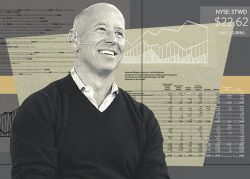Barry Sterlicht’s confidence in Starwood Property Trust was on full display before analysts on Wednesday, as he explained that even a loan on a property that “burned to the ground” is expected to be fully repaid.
The loan backs Calistoga Ranch in California, which was destroyed by fire in November. Now the land is for sale, and it’s expected to trade for “substantially more” than the remaining loan balance, Sternlicht said as he opened his remarks during the real estate investment trust’s first quarter earnings call.
The billionaire chairman and CEO of Starwood also offered his insights on the market. He predicts overall demand will slow, and he’s expecting a recession. But not to worry if you are a Starwood investor, he said: The real estate investment trust has an average 57 percent loan-to-value ratio for its portfolio of loans, a statistic repeated throughout the call.
“It would have to be a complete wholesale destruction of the economy to really dramatically injure us, with demand destruction that would empty office buildings or cause unemployment to skyrocket and wage growth to cease and reverse,” Sternlicht said.
At this point in time, consumers have purchased everything they need, are traveling and spending the last of their stimulus savings, and employees who quit their jobs are rejoining the workforce, he said.
Read more


Echoing previous earnings calls, Sternlicht touted the strength of Starwood’s 15,000-unit affordable housing portfolio in north and central Florida, where “rents can’t go down” and are rising as median incomes increase. He said Starwood is the largest owner of apartments in the U.S. with 115,000 units.
“Multifamily is having an incredible run,” Sternlicht said. “Cap rates will be under pressure if rates keep rising, but rental growth is so strong, it’s overwhelming any issues” with rising interest rates.
He also touched on the supply chain, saying he doubts much of what is in the pipeline “will ever get built” and if it does, it won’t be completed on time.
“There is no project I’m aware of that is delivering on time and on budget right now, either here or in Europe,” he said, citing an unnamed developer building a residential project in Miami who is one and a half years late in delivering it because of supply chain issues.
Greenwich and Miami Beach-based Starwood reported $324.6 million in first quarter earnings, or $1.02 per share, up 191 percent from the same period of 2021. The REIT reported $294 million in revenue for the first quarter, up about 2 percent from $287 million in the same period of the previous year. The company’s stock rose about 1 percent to $24.20 per share as of market close Wednesday, compared with an opening price of $23.90.
Sternicht pointed to nuances in office markets around the country. Miami will likely be overbuilt shortly, while Dallas, Austin and Nashville are all “really powerful” office markets, he said. And in weaker markets like New York, “good assets are leasing, and leasing quickly at great rates, but commodity assets are having a harder time.”
Retail is “obviously still a four-letter word,” he said. (This is an improvement from November 2020, when he said all real estate was a “four-letter word” in the capital markets.
Regarding hotels, occupancies and rates are up. But not in San Francisco.
“San Francisco is the worst hotel market in the United States by 1 million miles and probably will remain very challenging,” he said.
Sternlicht also addressed how he is reminded of the dot-com bubble, with a current tech correction that “feels bad.”
Starwood, he said, is “a great place to park cash right now, as the tech world melts down.”
“You’re seeing the fantasy explode. But we’re just boring. We just pay our dividend and continue to execute our business. … We are a sea of stability in a world that’s extremely volatile, and increases in interest rates only help us and help our returns.”
